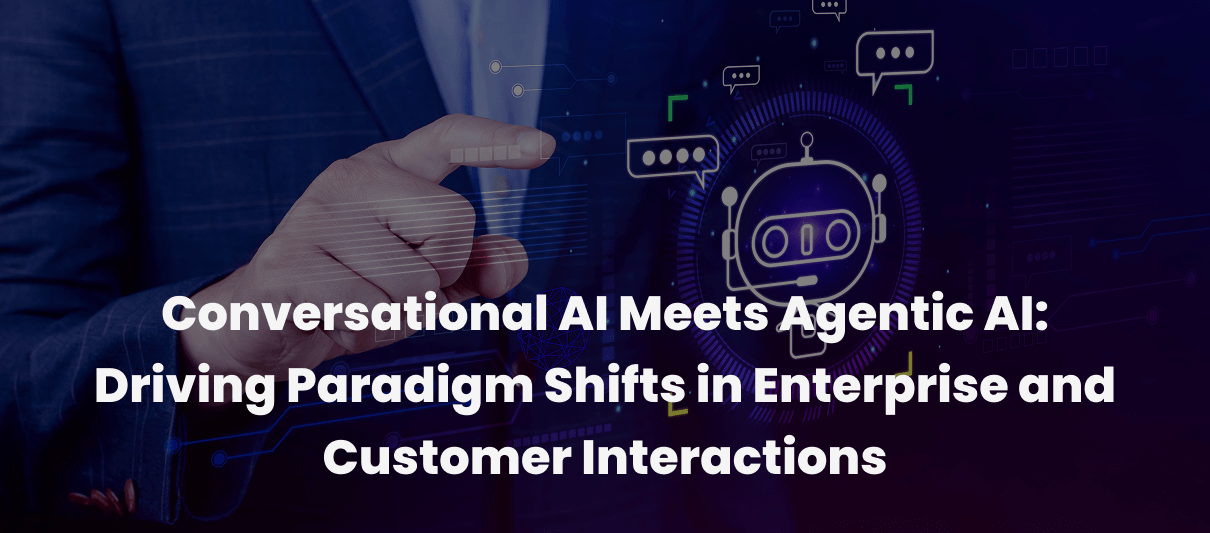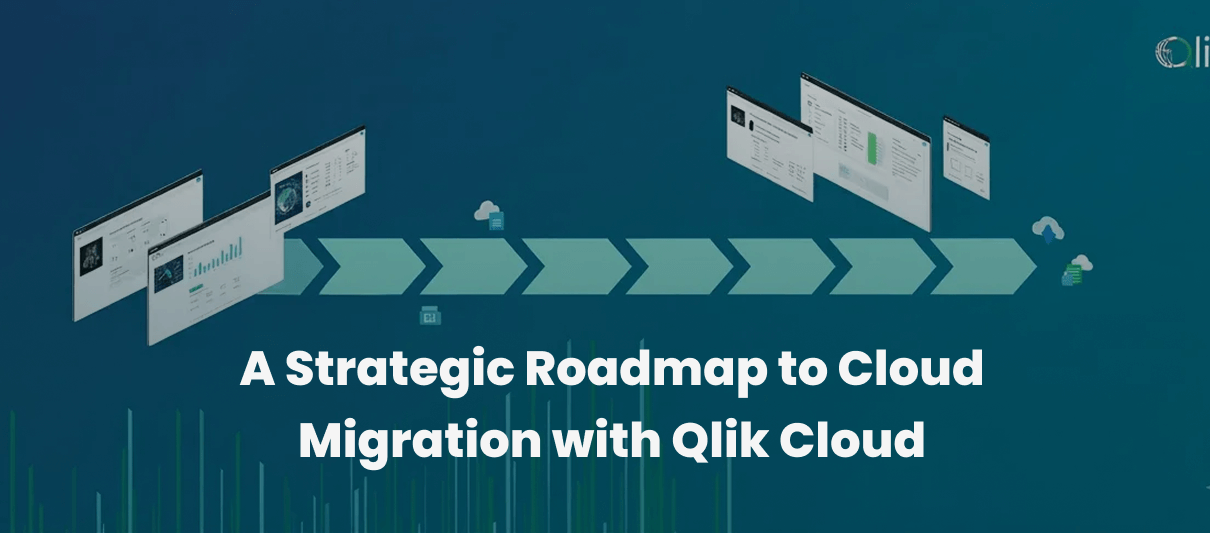Agentic AI in Banking: Use Cases, Benefits & Future Trends
Introduction
As Stanford’s 2024 AI index report highlights, computing systems, driven by advanced technologies, are now working more like humans in understanding language and recognizing images than ever. This progress paves the way for agentic AI across industries including financial services. Embracing agentic AI in banking is not just a technological shift but a business imperative to scale up organisations.
Staying updated with advanced technology makes your organization committed to constant growth enhancing your credibility and reliability among people. Agentic AI, a system adaptable to today’s fast-paced, tech-driven world, can unlock unprecedented success for financial organizations, reshaping the future of banking.
The interconnected software and applications introduce unprecedented challenges in sensitive data handling and data privacy, which can be addressed with Agentic AI models.
This blog will discuss how agentic AI works as a significant gamechanger in the banking industry highlighting the real-time use cases, benefits and future trends.
Utilising Agentic AI in Banking: The Major Use Cases
Replacing robotic chatbots delivering limited outputs with intelligent self-optimisable agentic AI systems is one such instance of how agentic AI is empowering banking sectors. The transformative potential of agentic AI in banking is dynamic indeed. With the provisions of efficient data analytics, predictive analytics and autonomous decision-making abilities, it enables the next frontier of technological innovation in financial services. By involving domain-specific AI agents teamed up together agentic AI models help to overcome the challenges in ethics, operation, security and compliance in banking sectors. Some of the use cases of agentic AI in banking include:
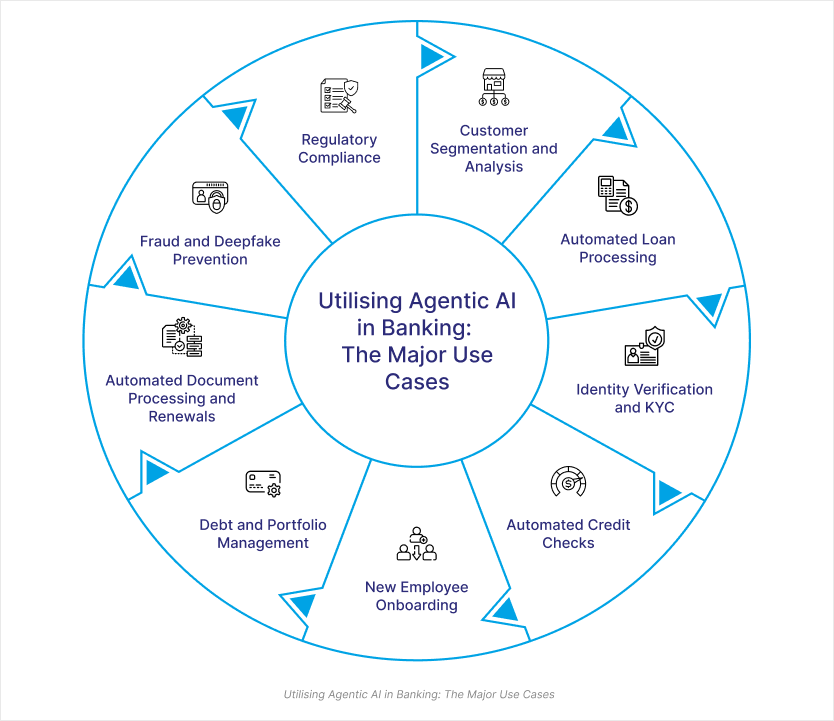
Fraud and Deepfake Prevention
By automating processes like investigation of questionable activities, blocking compromised accounts, and tracking suspicious transactions, agentic AI systems help to minimise fraud risks in banking sectors. The systems can also be used to detect subtle inconsistencies in AI-generated videos, images, and other media to identify if there is any deepfake impersonation attempt. With iterative self-learning capabilities, agentic AI involving big data analytics and ML technology can detect even the most complex frauds.
Automated Document Processing and Renewals
Whether it is a contract, mortgage paper or other financial documents, agentic AI simplifies the process while lowering the error rates and shortening the processing time. The tiresome process of contract renewal is also made easy with the automated technology driven by agentic AI. The pre-assigned AI agents work efficiently to review the documents, verify the details and proceed with the approval process, without requiring human instructions.
Debt and Portfolio Management
Agentic AI helps to plan effective strategies, ensure efficient practices and simplify the processes of managing debt for consumers in banks. By analysing customers’ expenditure patterns and loan repayment capabilities, agentic AI helps them to make the right financial decisions. On the other hand, with its human-like reasoning capabilities, it contemplates individual risk tolerance and financial objectives and provides with personalised investment guide for their financial portfolios. The investment guides are designed to maximise returns while harmonising with the market conditions.
New Employee Onboarding
One significant use case of agentic AI in banking is the new employee onboarding process. In any financial organisation, new employees need access to HR systems along with certain tools and confidential data specific to their roles. Previously, new hires would have to engage with a range of helpdesk workers. Additionally, tasks like retrieving passwords, logging into different systems, and getting the credentials for the job roles would make the overall onboarding process complicated and time-consuming. Now, empowered with agentic AI, HR systems can learn quickly about new employees’ requirements and provide automated access by the respective employee’s joining date.
Automated Credit Checks
With agentic AI integrated into the banking systems, checking accurate credit scores becomes easy for customers. At the same time, banks can analyse customer data from different sources like transaction patterns, utility payments, financial resources allocation history, etc. to assess the creditworthiness of customers. The advanced algorithms in agentic AI also help banks predict default credit risks. By providing personalised credit health recommendations, financial organisations can elevate customer experiences.
Identity Verification and KYC
When onboarding a customer in a bank must be seamless to ensure customer satisfaction, verifying customer identity and validating their data used to be a tedious process. The complicated and long procedures could drive customers to other competitors. Agentic AI systems, by assimilating tools like biometrics, automated data validation procedures, and ID verification methods simplify the process and accelerate the KYC process. The advanced technology also ensures convenience and maximises accuracy.
Automated Loan Processing
Replacing manual processes with automated technologies, agentic AI refines the overall process of loan decisions and approvals in banking sectors. The requirement for human intervention in the overall process is reduced as AI agents take responsibility for making decisions. Digitalized application procedures, using e-signatures, syncing customer data with intelligent AI agents, etc. are diverse ways through which agentic AI ensures less processing time and better customer satisfaction in case of loan approvals.
Customer Segmentation and Analysis
Agentic AI technology can categorise customers efficiently based on their demographics which helps the banks market their products and services to specific customer groups according to their needs. Thus, the conversion rates can go higher. Additionally, the agentic AI models identify the shifts in the customers’ preferences and considering the changes, they can think about modifying their services and products accordingly. It helps banks stay ahead of the competition in the market and grow their organisations sustainably.
Regulatory Compliance
Maintaining compliance with the latest laws and regulations is necessary to ensure uninterrupted service in any financial organisation. But, conducting compliance checks and updating company policies regularly is resource-intensive. This shortcoming can be overcome when you leverage agentic AI. Developed with certain AI agents combiner, it ensures consistent monitoring of regulation updates and streamlines the reporting process for any changes. Thus, banks can mitigate the risks of non-compliance.
Agentic AI, designed to work more like humans, can be utilized to perform diverse sorts of business processes within banks such as generating quick meeting notes, case summarization, efficient knowledge-base creation, etc.
The Benefits of Utilizing Agentic AI in the Banking Industry
Fouzi Husaini, the CTO and chief AI officer at Marqeta, describes embracing agentic AI as having unlimited “really smart interns.” Agentic AI is the latest evolution in AI that involves a network of specialized AI agents coordinated with each other orchestrating each AI agent to complete an objective successfully. The benefits of agentic AI in banking that need to be harnessed properly are as follows:
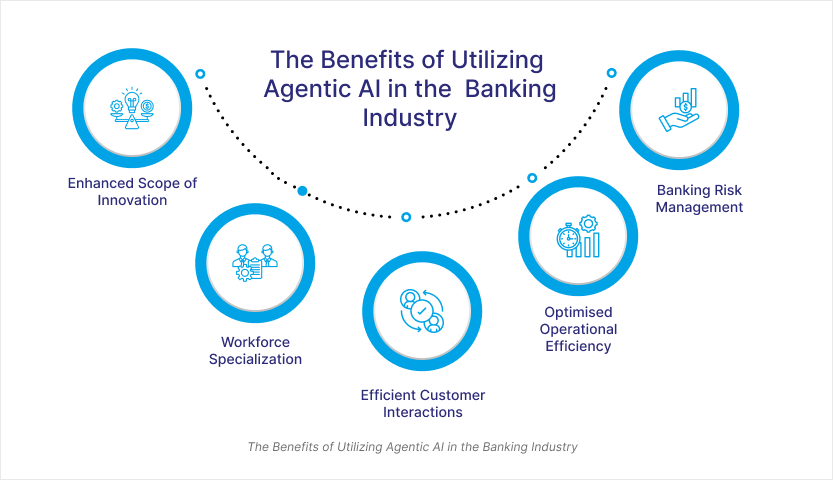
Enhanced Scope of Innovation
Underpinned by ML, NLP, and deep learning technology, Agentic AI can handle complex and multi-step tasks without human instructions. With its improved judgemental power and proactive execution skills, agentic AI drives innovation and fosters experimentation. You can develop new financial tools like personalised robo-advisors and asset management systems. The self-learning capabilities make agentic AI smarter every day and adapt to the ever-changing financial business landscape.
Workforce Specialization
When a specific work is divided into distinct operations, the task is performed efficiently. However, this division of labour can be difficult to bring into practice due to the shortage of qualified workforce with relevant skills. Agentic AI, involving several AI agents and their ability to carry out very granular tasks fulfils the workforce gaps and helps the workforce focus on specialising in respective operations.
Efficient Customer Interactions
The cognitive reasoning of agentic AI systems ensures that the systems can quickly and efficiently sift and differentiate information sources from which they can assimilate customer data. By collecting the most relevant and updated information from scattered customer data in different channels, agentic AI can utilise the information to enhance interactions between banks and their customers. It simplifies the query resolution process and provides with 24*7 efficient customer support.
Optimised Operational Efficiency
Agentic AI by combining diverse technologies automate repetitive tasks, identify gaps in the current work process and improves that with their autonomous capabilities. Without human intervention, it can analyse large datasets to recognise patterns and also predict upcoming trends. Thus, agentic AI optimises the operational efficiency of any bank and provides valuable insights to enhance it further.
Banking Risk Management
Financial organisations including banks are posed with significant risks like inaccuracy and fraudulent activities. Intelligent AI agents can quickly detect mismatched data, identify anomalies and predict the chances of fraudulent activities. Depending on the outcomes, agentic AI can help banks take proactive risk management strategies like real-time transaction monitoring tool, data verification methods, and so on.
Being responsive to the latest AI technologies is the need of the hour. Agentic AI combines such cutting-edge artificial intelligence agents to ensure growth for banking organisations. As a Delloite report mentions, agentic AI is now one of the most interesting areas in AI development today. Here are the future trends of agentic AI in financial services that banks should look forward to:
The Future Trends of Agentic AI in Financial Services
The ability to leverage agentic AI is eventually becoming a critical parameter to measuring banks’ efficiency in managing risks and delivering superior customer experiences.
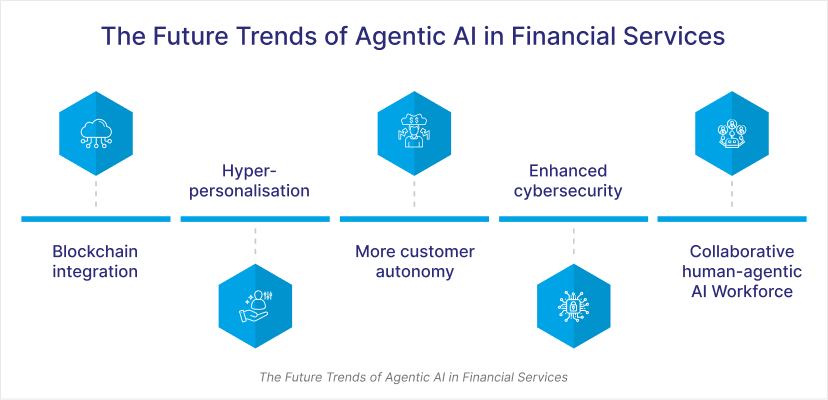
Blockchain integration
With its decentralised and immutable data management capabilities, blockchain technology is becoming a key trend in the development of agentic AI. The technology makes agentic AI models more transparent and secure, providing them with a robust platform for managing and sharing data autonomously. In this way, trust among customers for the financial organisation also increases.
Hyper-personalisation
While agentic AI systems has introduced personalisation in financial services, in the near future hyper-personalisation is going to be a crucial trend. The financial tools and strategies are predicted to be more customer-centric. AI-powered customer interactions are expected to be more refined, human-alike and more capable to answer complicated queries.
More customer autonomy
When agentic AI, with its self-learning feature, develop more, it can be utilised to equip customers with the scope of handling their transactions and other financial services on their own without roaming around diverse helpdesks. With the help of AI-driven intelligent virtual assistants, they can comprehend the most beneficial choices for them while opting for financial services.
Enhanced cybersecurity
With more reliance on data and artificial intelligence, the risks of cyber threats are supposed to increase. To adapt to that complex scenario, the latest versions of agentic AI are predicted to appear with enhanced cybersecurity capabilities. They will help banks to identify even the most complex threats and take protective measures promptly.
Collaborative human-agentic AI Workforce
A new agentic AI trend is expected to appear soon which will involve a team of AI agents taking up the roles of customer support and sales development, whereas humans will train, coordinate and supervise them. In such a hybrid environment, humans are predicted to collaborate with AI assistants to bring maximum accuracy and efficiency without consuming much time.
Today’s dynamic business environment is expected to see new regulatory and technological changes often, complying with which will be crucial for banks. Agentic AI technology will grow from its current stage of infancy and become more efficient in monitoring the changes and aligning organisations with them quickly.
About SquareOne
With 16 years of expertise, SquareOne drives digital innovation for companies across various industries including banking sectors and helps with data-driven storytelling in business operations. Our solutions in Automation, Data & AI, Low-code App modernization, Content management, and Fraud & Risk protection enhance business growth through strategic innovation and partnerships.
Final Words
Being capable of handling multi-layered, complex tasks, across diverse domains, Agentic AI is transforming financial enterprise software development. For example, when a customer comes with a dispute in transactions, it is first verified through IVR-based systems whether the transaction is genuinely attempted by the customer and not any fraud. In this way, with the integration of agentic AI, how banks interact with technology and manage tasks is reimagined. Leveraging agentic AI in banking broadens the path of new possibilities and better scaling opportunities for the organization while ensuring trust among customers. The risks of losses are minimised and overall banking service quality is improved meeting customers’ expectations.
Want to embrace agentic AI technology in your banking organisation? Let SquareOne address your needs.


